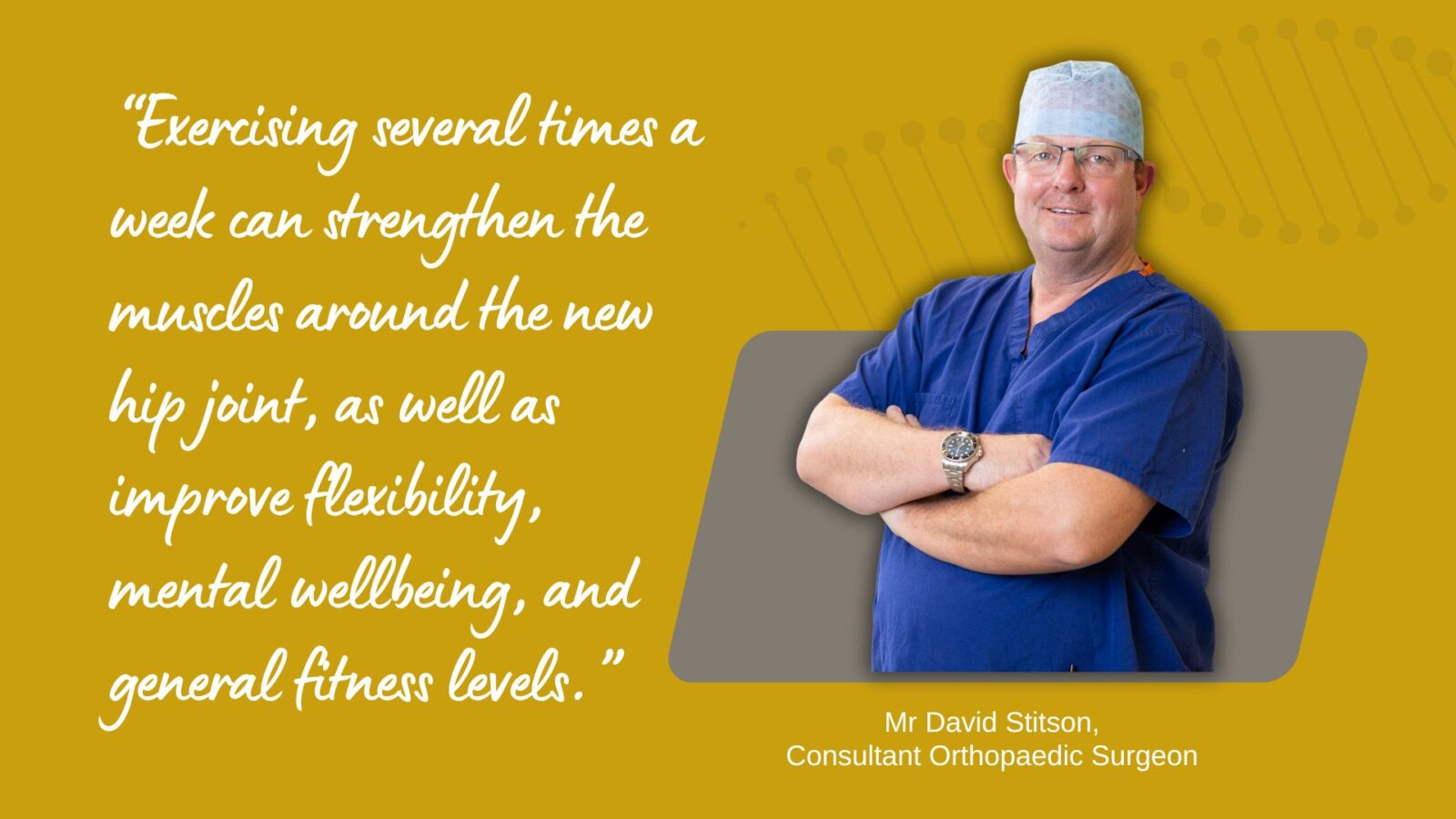Sport and exercise play a crucial role in the recovery process following hip surgery and should not be underestimated.
Exercising several times a week can strengthen the muscles around the new hip joint and improve flexibility, mental well-being, and general fitness levels. Maintaining a healthy weight can also help reduce the stress on the new hip joint.
Contents
ToggleHere are 7 reasons why sport and exercise are important following hip surgery:
Muscle Strength and Flexibility:
Hip surgery, in addition to the chronic pain associated with the arthritis before it, can lead to muscle weakness and stiffness. Engaging in targeted exercises helps rebuild strength and flexibility in the muscles surrounding the hip joint. This not only aids in recovery but also helps prevent future injury.
Joint Mobility:
After hip surgery, it is essential to regain a proper range of motion in the hip joint. Regular exercise helps maintain and improve joint mobility, reducing the risk of stiffness and promoting better function.
Bone Health:
Weight-bearing exercises, such as walking, jogging, and resistance training, can help to maintain bone density. This is particularly important for individuals who may have weakened bones due to conditions such as osteoporosis or prolonged immobility before surgery. Jogging or running after a hip replacement should only be done after a discussion with Mr Stitson.
Pain Management:
Exercise stimulates the release of endorphins, which are natural pain relievers. By incorporating physical activity into your daily routine, it will help you to manage post-surgical pain more effectively and potentially reduce the need for pain medication.
Enhanced Recovery:
Engaging in sports and exercise can expedite the recovery process following a total hip replacement by improving circulation, promoting tissue healing, and reducing inflammation. However, it’s crucial to follow Mr Stitsons recommendations and avoid activities that could hinder the healing process or put your joint replacement at risk.
Mental Well-being:
Surgery and the recovery process can take a toll on mental health. Participating in sports and exercise not only distracts from discomfort but also boosts mood and reduces stress and anxiety.
Long-Term Health Benefits:
Adopting a physically active lifestyle post-surgery sets the foundation for better long-term health. Regular exercise can lower the risk of chronic diseases, such as cardiovascular disease, diabetes, and obesity that are often associated with sedentary behaviour.
It is important to note that the type and intensity of exercise should be tailored to your individual needs and take into account factors such as your age, overall health and the specific nature of your surgery.
Always consult with Mr Stitson or a physiotherapist before starting any exercise program post-surgery.
They can provide personalised guidance and ensure that you are engaging in activities that are both safe and beneficial for your recovery.
If you are experiencing persistent hip pain, stiffness or reduced mobility, it is essential to consult with a healthcare professional, such as Mr Stitson, who can provide you with an accurate diagnosis and a personalised treatment plan.
About Hip Surgery
Total hip replacement surgery replaces the worn-out painful and stiff hip joint with a new prosthetic joint. This procedure is normally performed under spinal anaesthesia and is commonly followed by a night or two in the hospital. Day-case hip replacement surgery may be an appropriate option for you.

About Mr Stitson
David Stitson is a Plymouth-based Consultant Trauma and Orthopaedic Surgeon. Trained both in the UK and internationally, he has worked in medicine for more than 20 years for the NHS, for the Royal Air Force and in private practice. Mr Stitson operates privately at the Nuffield Health Hospital, Plymouth.

The Nuffield Plymouth CQC Rating
The Nuffield Hospital has a history that spans over half a century and has built a reputation for high standards of care, professionalism and expertise in delivering health services. They aim for continuous quality improvement in everything they do.
Active Quality and Governance programmes are in place at the Nuffield Hospital Plymouth. As part of this, the hospital is inspected by independent healthcare regulators to ensure it meets the fundamental standards of quality and safety as determined by the regulating body (CQC).
In the most recent inspection, Plymouth Nuffield Hospital was rated as ‘Good’ overall, however, the surgical element of the inspection was rated as ‘Outstanding’. The hospital was referred to as:
“Outstanding in effective and caring, and
Good in safe, responsive and well-led.”





